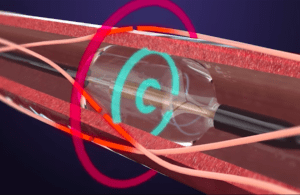
ReCor Medical said its Paradise ultrasound renal denervation (uRDN) treatment showed consistent and significant blood pressure reductions in an analysis of pooled data from its ReCor’s three Radiance randomized hypertension studies.
“Pooling the data from the Radiance program demonstrates that treatment with the Paradise uRDN System results in a consistent reduction in blood pressure across differing severities of hypertension,” Dr. Ajay Kirtane, a co-principal investigator on the study, said in a news release. “The consistent and clinically meaningful BP reduction across multiple patient groups increases our interest in the use of uRDN as a potential therapeutic option, when added to lifestyle modification and medications for our patients with uncontrolled blood pressure.”
PREVIOUSLY: ReCor Medical uRDN trial meets primary efficacy endpoint
Kirtane presented the results at this week’s 2022 American Heart Association (AHA) conference in Chicago. Kirtane is a professor of medicine at Columbia University’s Vagelos College of Physicians and Surgeons and an interventional cardiologist at NewYork-Presbyterian/Columbia University Irving Medical Center.
Palo Alto, California-based ReCor and parent company Otsuka Holdings analyzed pooled data from more than 500 patients randomized in ReCor’s three Radiance studies, covering patients on and off medication with reistant hypertension and mild-moderate hypertension.
“It is very important that the Radiance pooled analysis demonstrated a consistent blood pressure reduction in patients across a range of hypertension and both with and without antihypertensive medication, thus broadening the potential applicability of uRDN,” study principal investigator Michel Azizi, a professor of medicine at Université Paris Cité, said in the news release. “Just as important, more than 50% of patients treated with uRDN in the pooled analysis either achieved daytime ambulatory BP control or had a greater than 10 mmHg decrease in daytime ambulatory systolic BP at two months, showing the potential benefits of uRDN as an element of a treatment regimen for patients with uncontrolled hypertension.”
All three studies met their primary endpoint of statistically significant daytime systolic ambulatory blood pressure at two months. ReCor said those blood pressure reductions — if maintained long-term — correlate to a potential 25% reduction in cardiovascular risk.
RELATED: Medtronic RDN trial fails to beat hypertension drugs; data submitted for FDA review
The Paradise uRDN System has the CE mark for hypertension treatment and is an investigational device in the U.S. and Japan. ReCor plans to submit results of the Radiance program to the FDA as part of a premarket approval request. ReCor has also initiated the Global Paradise System registry in the EU with plans for global expansion.
ReCor Medical is part of Otsuka Holdings’ Otsuka Medical Devices subsidiary.